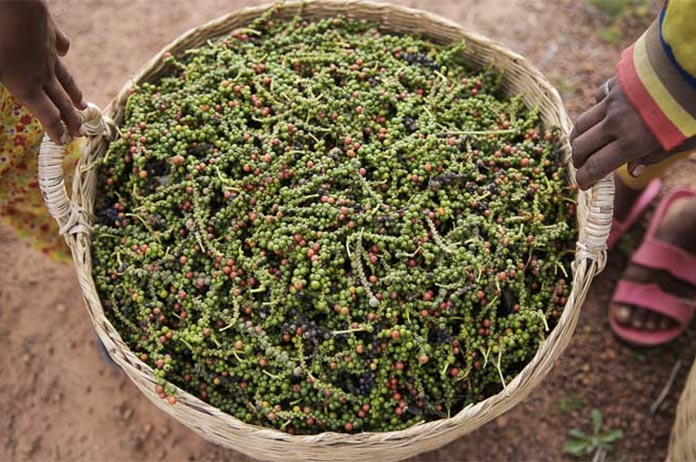High Times For Kampot Pepper

The Kampot Pepper Promotion Association exported 60 tonnes of Kampot pepper during the first nine months of 2017 and aims to reach 80 tonnes by the end of the year.
Higher yields due to favourable weather conditions and the presence of new, large plantations contributed to a notable hike in exports, said Ngoun Lay, the association’s president.
“Production this year is better compared to previous years due to good weather conditions, with plenty of rainfall in the beginning of the year. A good number of plantations have been able to cultivate the crop,” Mr Lay said.
Most of the pepper association’s produce will be sent abroad, with only a small percentage remaining here to supply the local market, Mr Lay said, adding that from January to September, the EU, the US and Japan were the biggest markets for Kampot pepper.
“By the end of 2017, we expect to produce at least 80 tonnes for export due to larger yields,” Mr Lay said.
The association exported about 60 metric tonnes of pepper during the years 2004 and 2005. However, only 53 metric tonnes were sent beyond Cambodia’s borders in 2016 due to adverse weather conditions, including severe droughts throughout the country.
One tonne of Kampot black pepper is valued at $15,000, while red pepper and white pepper cost $25,000 and $28,000 per tonne, respectively.
Land allocated to the cultivation of Kampot pepper has been on the rise since 2009, when the association was first established, from 10 hectares in 2009 with 100 pepper farmers to 210 hectares in 2017 and 387 farmers.
Kampot pepper was awarded the geographical indication (GI) certification from the EU in 2015, which guarantees a certain price in international markets. However, industry experts say Kampot pepper could sell for much more abroad if the commodity also received an organic certification.
Song Saran, the CEO of Amru Rice Cambodia, a company that works with 200 farmers over 300 hectares of land under contract farming models, said organic techniques for pepper cultivation can be difficult to implement as they require intense labour and advanced skills.
“Having an organic certification can help reduce surpluses, expand our market and help the product sell for twice as much,” he said. “However, farmers need to undergo training on the new techniques.”
Kampot Pepper Promotion Association’s Mr Lay also thinks organic techniques can be costly to put into effect.
“Traders and pepper exporting companies want pepper products labeled as organic because it can be a factor in increasing sales,” he said. “However, only big farms are able to apply for the certificates because it is an expensive process.”
Pepper is planted in 19 provinces throughout the country, with Tbong Khmom, an eastern province that shares a border with Vietnam, contributing about 75 percent of total production.
Total pepper production in the country is forecast to increase by about 70 percent in 2017, from 11,800 tonnes in 2016 to 20,000 tonnes by the end of the year, according to figures from the Ministry of Agriculture.